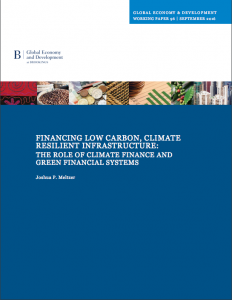Full Title: Financing low carbon, climate resilient infrastructure: The role of climate finance and green financial systems
Author(s): Joshua P. Meltzer
Publisher(s): The Brookings Institution
Publication Date: September 1, 2016
Full Text: Download Resource
Description (excerpt):
Over the next 15 years (2015-2030) the world will need to build on the order of US $75-$86 trillion in infrastructure—approximately double the estimated $50 trillion stock of infrastructure. This increases to $116.55 trillion once investments in energy efficiency and primary energy are included. Around 70 percent of these infrastructure needs will be in emerging markets and developing economies (EMDCs).
Yet, approximately 70 percent of greenhouse gas GHG emissions come from infrastructure such as electricity generation, transportation, industry and buildings. Infrastructure is also central to how societies adapt to climate change. As a result, building the same infrastructure as before—high carbon infrastructure such as coal-fired power stations, low energy efficiency buildings, and more roads to congested cities, will lock the world into a high carbon path that would all but guarantee that the goals agreed at the Paris climate summit of keeping global temperature increases below 2 degrees Celsius and of enabling communities to adapt to climate change will not be met.
Bad infrastructure also kills—it increases air pollution, exacerbates urban congestion, and degrades the environment. This underscores the importance of building low-carbon climate resilient infrastructure (LCR).
Moreover, climate change will have a disproportionate impact on the poorest and most vulnerable communities. This makes building LCR infrastructure also necessary in order to prevent a reversal of the development gains made thus far.
